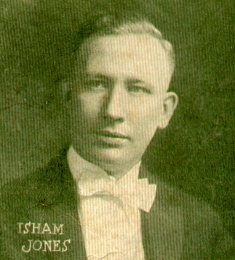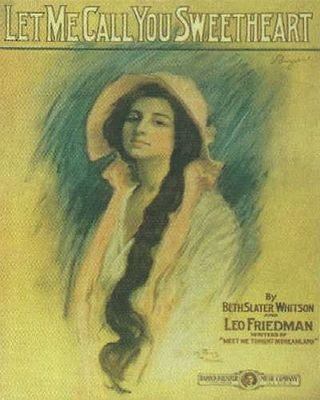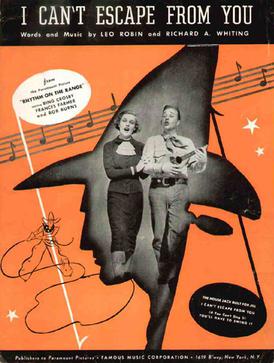
Isham Edgar Jones was an American bandleader, saxophonist, bassist and songwriter.
"All Alone" is a popular waltz ballad composed by Irving Berlin in 1924. It was interpolated into the Broadway show The Music Box Revue of 1924 where it was sung by Grace Moore and Oscar Shaw. Moore sat at one end of the stage under a tightly focused spotlight, singing it into a telephone, while Oscar Shaw sat at the other, doing the same.

"Moonlight Bay" is a popular song. It is commonly referred to as "On Moonlight Bay". The lyrics were written by Edward Madden, the music by Percy Wenrich, and was published in 1912. It is often sung in a barbershop quartet style. Early successful recordings in 1912 were by the American Quartet and by Dolly Connolly.

"I'll See You in My Dreams" is a popular song and jazz standard, composed by Isham Jones, with lyrics by Gus Kahn, and published in 1924. It was recorded on December 4 that year, by Isham Jones conducting Ray Miller's Orchestra. Released on Brunswick Records, it charted for 16 weeks during 1925, spending seven weeks at number 1 in the United States. Other popular versions in 1925 were by Marion Harris; Paul Whiteman; Ford & Glenn; and Lewis James; with three of these four reaching the Top 10.
"The One I Love (Belongs to Somebody Else)" is a popular song composed by Isham Jones with lyrics by Gus Kahn. The song was recorded by Isham Jones' Orchestra on December 21, 1923, at Brunswick Studios in New York City, and published on January 7, 1924. On January 17 in Chicago, Jones recorded another version, with Al Jolson on lead vocals. Both versions made the charts that Spring, with Jolson's peaking at number 2, and Jones' at number 5. Sophie Tucker recorded her version February 1924, released on Okeh 40054.
"Button Up Your Overcoat" is a popular song. The music was written by Ray Henderson, the lyrics by B.G. DeSylva and Lew Brown. The song was published in 1928, and was first performed later that same year by vocalist Ruth Etting. However, the most famous rendition of this song was recorded early the following year by singer Helen Kane, who was at the peak of her popularity at the time. Kane's childlike voice and Bronx dialect eventually became the inspiration for the voice of cartoon character Betty Boop.

"Somebody Loves Me" is a popular song, with music written by George Gershwin, and lyrics by Ballard MacDonald and Buddy DeSylva. The song was published in 1924 and featured in George White's Scandals of 1924.

"Let Me Call You Sweetheart" is a popular song, with music by Leo Friedman and lyrics by Beth Slater Whitson. The song was published in 1910 and was a huge hit for the Peerless Quartet in 1911. A recording by Arthur Clough was very popular the same year too. A 1924 recording identifies a Spanish title, "Déjame llamarte mía".
"It's Easy to Remember " is a popular song written by Richard Rodgers with lyrics by Lorenz Hart.

"Down Among the Sheltering Palms" is a popular song.
"Now It Can Be Told" is a popular song written by Irving Berlin for the 1938 film Alexander's Ragtime Band, where it was introduced by Alice Faye and Don Ameche. It was nominated for an Academy Award in 1938 but lost out to "Thanks for the Memory".
"I've Got Five Dollars" is a 1931 popular song composed by Richard Rodgers, with lyrics by Lorenz Hart for the musical America's Sweetheart (1931) where it was introduced by Harriette Lake and Jack Whiting.

"Alabamy Bound" is a Tin Pan Alley tune written in 1924, with music by Ray Henderson and words by Buddy DeSylva and Bud Green. It was popularized by Al Jolson and included in the musical Kid Boots, where it was sung by Eddie Cantor. Successful recordings of the song were released in 1925 by Paul Whiteman, Isham Jones and Fletcher Henderson (instrumentals), as well as Blossom Seeley, whose vocal version reached number 2 on the charts. The song has sold over a million copies of sheet music and has been included in several films over the years.

"Way Down Yonder in New Orleans" is a popular song with music by John Turner Layton Jr. and lyrics by Henry Creamer. First published in 1922, it was advertised by Creamer and Layton as "A Southern Song, without A Mammy, A Mule, Or A Moon", a dig at some of the Tin Pan Alley clichés of the era.
"Make Believe" is a show tune from the 1927 Broadway musical Show Boat with music by Jerome Kern and lyrics by Oscar Hammerstein II.
"Bouquet of Roses" is a 1948 song written by Steve Nelson (music) and Bob Hilliard (lyrics). It was originally recorded by Eddy Arnold and his Tennessee Plow Boys and his Guitar in Chicago on May 18, 1947. It was released by RCA Victor as catalogue number 20-2806 and by EMI on the His Master's Voice label as catalogue numbers BD 1234 and IM 1399. "Bouquet of Roses" was Eddy Arnold's third number one in a row on the Juke Box Folk Record chart and spent 19 weeks on the Best Selling Folk Records chart. In 1949, when RCA Victor introduced its new 45 RPM single format this record was among seven initial releases and the first in the Country and Western category. Arnold would re-record "Bouquet of Roses" several times during his career.

"Swingin' Down the Lane" is a 1923 song composed by Isham Jones with lyrics by Gus Kahn. Jones' instrumental version was second to "March of the Wooden Soldiers" in the list of top songs for 1923. Other popular versions in 1923 were by Ben Bernie, and The Columbians.

"I Can't Escape from You" is a song written music by Richard A. Whiting and lyrics by Leo Robin for the 1936 Paramount Film "Rhythm on the Range", and first introduced in the film when Bing Crosby sang it to Frances Farmer. Crosby recorded it for Decca Records that same year with the Jimmy Dorsey Orchestra and it was in the hit parade for 11 weeks reaching a peak position of No. 7. Crosby recorded the song again in 1954 for his album Bing: A Musical Autobiography.
"Sweet Sue, Just You" is an American popular song of 1928, composed by Victor Young with lyrics by Will J. Harris. Popular versions in 1928 were by Earl Burtnett and by Ben Pollack.
"Miss You" is a 1929 song by the Tobias brothers: Charles Tobias, Harry Tobias and Henry Tobias. It was the three brothers' first published song, and their first hit, but one of the few songs where all three collaborated.










